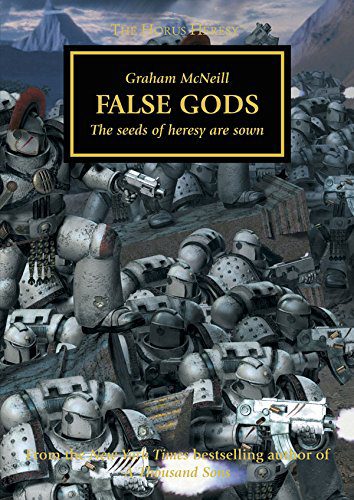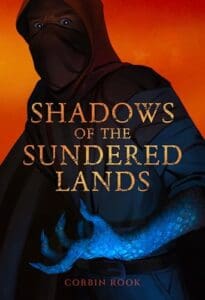
Synopsis
The Great Crusade that has taken humanity into the stars continues. The Emperor of Mankind has handed the reins of command to his favoured son, the Warmaster Horus. Yet all is not well in the armies of the Imperium.
Horus is still battling against the jealousy and resentment of his brother primarchs, and when he is injured in combat on the planet Davin, he must also battle his inner daemon. With all the temptations that Chaos has to offer, can the weakened Horus resist?
Review
If the Horus Heresy series was pure Ruinous Chaos, and Horus Rising (book one) merely showed me a glimpse into what chaotic power lay within, then False Gods kicked the door open, grabbed me by the scruff of my neck, and pulled me kicking and screaming into the abyss.
Written by Black Library royalty (and now one of the main writers for the Netflix smash hit and every nerds favourite TV show, Arcane) Graham McNeill, False Gods pretty much picks up where book 1 ended. Its also a very different book to what Horus Rising was going for. Horus Rising showed us the hypocrisy of the Imperium at the time it was in the 30k era, exploring themes that completely contradict where the setting of Warhammer 40,000 finds itself in the 10,000 years after this galaxy changing event. It was a very philosophical novel in that regard. False Gods, however, is pure plot & character, driving at a very brisk pace and never really slowing down. In fact, as the book proceeds, I’d say it simply and consistently ramps up. It feels like watching a train wreck in slow motion (something that I could use to describe many of the Horus Heresy books so far), one you cannot look away from no matter how devastating.
We again follow the Luna Wolves legion, now renamed the Son of Horus (with a new paint job on their armour to show this) as they continue the 63rd expedition in conquering the galaxy in the name of the Emperor of Mankind. However, moments and events, things that people have said (or not said), and a new growing religious rhetoric is starting to show cracks in the legion. Small cracks, albeit noticeable. Suspicions are arisen and once unbreakable loyalties are now marred. The characters who’s head we pop into (Loken, again, arguably the main protagonist) notices these things, only for the chasms between battle brothers to widen as the story progresses. We also get a bigger and bolder look at Chaos, in what is frankly one of the most thrilling moments in the series to date so far (for context, I have now read 9 Horus Heresy books).
The XVI Legion find themselves recalled to a previously conquered system of Davin, meeting up with the Word Bearers legion lead by their First Chaplain Erebus (fuck Erebus). And it is here that the characters, the galaxy, and the series as a whole reaches a turning point, one that is so gripping, enthralling, cinematic and exciting that I genuinely found it hard to put the book down during it. I wish, really wish, I could go into and discuss the events of this book much further, because still, nearly 11 months since I finished this book, I often find myself thinking back on them. But, in an effort to keep these reviews as spoiler free as possible, I simply can’t.
A side note: if anyone wants me to talk in depth about my experience with the Horus Heresy so far, please let me know. I’d be happy to write an article or even do a video/a livestream chat with someone!
Anyway, back to the review. McNeill has a brilliant ability to constantly keep the conflict and tension between characters ramping up in a steady and plausible way. He knows exactly how to handle this properly so that when he needs to, he lets this tension explode in magnificent fireworks. The characters are further deepened – as some from the first book merely, in my opinion, being there to serve one purpose or ideal – this time they come back as a credible and nuanced character. The action is sublime, exciting and pure edge of your seat stuff, with some proper moments of body horror. Plus, Graham, being one the main architects for the lore of the Horus Heresy as we know it, is also the master of foreshadowing imagery, maybe not something that occurs in this book, but a big something that happens in the wider lore.
But ultimately, if book one shows the cracks in the Warmaster Horus Lupercal’s metaphorical armour, this one showcases his true downfall. It’s pure Shakespearean tragedy, and I simply can’t get enough of it. For those that don’t know anything about the frankly fuck-off big lore of 40k, I think it would actually benefit to watch some beginner lore videos. Yes you will obviously know some things that happen, but not why, and False Gods shows you why. And when you experience it, you’ll wish you could reach into the pages to prevent it.
False Gods elevates the Horus Heresy series for me. It makes everything exhilarating, it has events that change the course of history, full of implications for further terrible disasters down the road. I strongly urge that if you start this series, you read books 1, 2 and 3 back to back, as they are essentially the three acts of the same story. Then I challenge to not want to keep reading, because from False Gods out, the Heresy is nigh, and there ain’t nothing you can do to stop it.








Leave a Reply